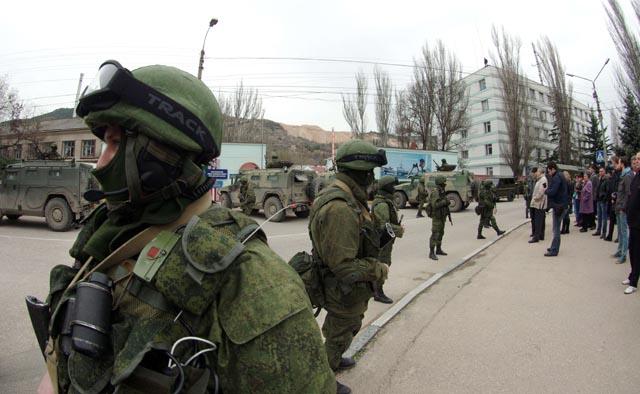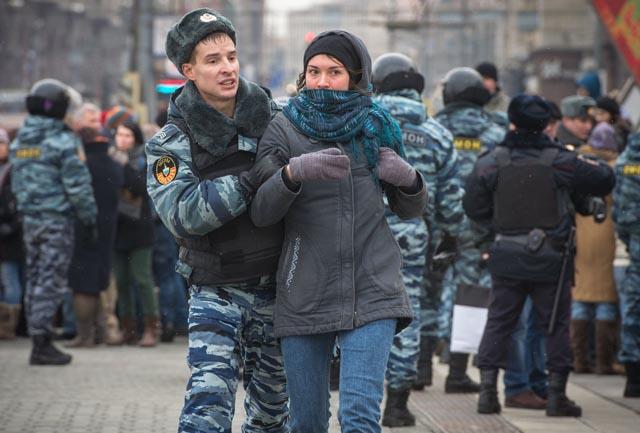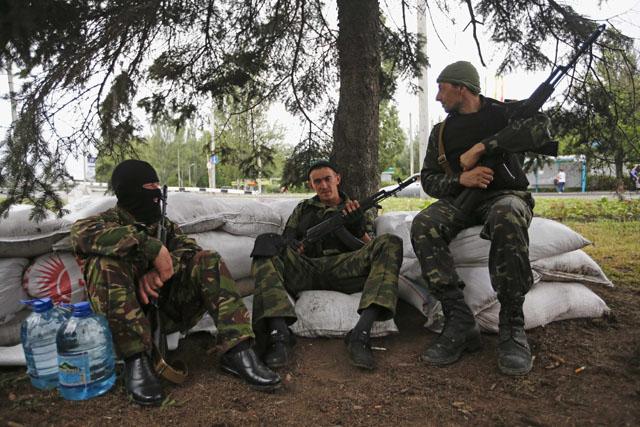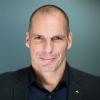You are here
Putin moves to send Russian troops into Ukraine
By AFP - Mar 01,2014 - Last updated at Mar 01,2014

MOSCOW — Russian President Vladimir Putin won the green light from parliament Saturday to send troops into Ukraine after a bloody three-month uprising that swept new pro-EU leaders to power but sparked unrest in the pro-Kremlin Crimean peninsula.
The stark escalation to what threatens to blow up into the worst crisis in relations between Moscow and the West since the Cold War came as Kalashnikov-wielding militia hoisted the Russia flag over Crimean government buildings and seized control of the peninsula’s airports.
Putin’s shock decision to seek the upper house of parliament’s authorisation to use force in the ex-Soviet country of 46 million came less than a day after US President Barack Obama warned that any such action would carry “costs” for Moscow.
Putin had remained silent since Ukraine’s parliament on
February 22 ousted pro-Kremlin president Viktor Yanukovych — who has since fled to Russia — after a week of carnage in Kiev that claimed nearly 100 lives.
The ex-Soviet country’s bloodiest crisis since its 1991 independence erupted in November, when Yanukovych rejected an historic deal that would have opened Ukraine’s door to eventual EU membership in favour of tighter ties with old master Moscow.
On Saturday the Kremlin said Putin had asked the upper house to authorise force “in connection with the extraordinary situation in Ukraine and the threat to the lives of Russian citizens”.
“I submit to the Federation Council a request to use the armed forces of the Russian Federation on Ukrainian territory until the normalisation of the political situation in that country,” the Kremlin quoted Putin as saying.
Putin said Russia also had to protect servicemen from the Black Sea Fleet that is based in Crimea’s port town of Sevastopol “fully in line with an international accord”.
The Federation Council unanimously approved Putin’s request after a lightning-fast debate.
Upper chamber chair Valentina Matviyenko also ordered the council’s foreign affairs committee to ask Putin to recall the Russian ambassador from the United States.
Matviyenko suggested sending in a “limited contingent” — a phrase that mimicked the language used for the Soviet Union’s invasion of Afghanistan in 1979.
There was no immediate indication about the number of troops involved. A senior senator said that would be up to Putin.
Ukraine’s Defence Minister Igor Tenyukh had earlier told the new Cabinet’s first session that Russia had sent 30 armoured personnel carriers and 6,000 additional troops into Crimea to help local pro-Kremlin militia gain broader independence from the new pro-EU leaders in Kiev.
He accused Russia of acting “without warning or Ukraine’s permission”.
Crimea appeal for help
Putin’s move came after an appeal for help from Crimea’s newly chosen premier, Sergiy Aksyonov — a ruler not recognised by Kiev and appointed by regional lawmakers after gunmen had seized the parliament building in the regional capital Simferopol on Thursday.
“I ask Russian President Vladimir Putin to help in ensuring peace and calm on the territory of Crimea,” Aksyonov said in an address broadcast in full by Russian state television.
Ukrainian boxer turned politician Vitali Klitschko responded to the Russian move by calling on parliament to ask interim President Oleksandr Turchynov to declare a “national mobilisation after the start of Russian aggression against Ukraine”.
British Foreign Secretary William Hague, who heads to Kiev on Sunday, said he had summoned the Russian ambassador to register his concerns over Moscow’s decision.
“This action is a potentially grave threat to the sovereignty, independence and territorial integrity of Ukraine. We condemn any act of aggression against Ukraine,” Hague said.
But one top Russian foreign ministry official indicated Putin may pause before sending troops into Ukraine.
“The agreement that the president received... does not mean that this right will be realised quickly,” Russian Deputy Foreign Minister Grigory Karasin told the state-run RIA Novosti news agency.
Kremlin spokesman Dmitry Peskov told the same agency that “for the moment, this decision has not been taken”.
Obama warning
Obama warned Putin Friday that “there will be costs for any military intervention in Ukraine”.
A senior US official separately told AFP that Obama and some key European leaders could skip June’s G-8 summit in Sochi if Moscow’s forces became more directly involved in Ukraine.
Putin’s request for force authorisation came after a flurry of diplomatic efforts to resolve what threatens to become the most dire crisis to hit Moscow’s relations with the West since the Cold War.
Britain’s Hague said he had urged a “de-escalation in Crimea” in a telephone conversation with Russian Foreign Minister Sergey Lavrov, while Germany and France also voiced concern.
Kiev’s new leaders have grappled with the dual threats of economic collapse and secession by regions that had backed Yanukovych.
The threat of a debt default that Kiev leaders warn could come as early as next week increased further when Russia’s state-owned Gazprom — often accused of being wielded as a weapon by the Kremlin against uncooperative ex-Soviet states — warned that it may be forced to hike the price it charges Ukraine for natural gas.
“The debt is $1.549 billion, it is huge,” Gazprom spokesman Sergei Kupriyanov told the RIA Novosti news agency.
“Clearly, with this debt Ukraine may not be able to keep its discount [to market price] for the gas.”
Ukraine won a one-third discount from Gazprom under a deal signed by Yanukovych with Putin that also saw Russia promise to buy $15 billion of government debt.
Ukraine’s new leaders have said that the country needs $35 billion over the coming two years to keep the economy afloat.
Related Articles
Ukraine warned Sunday it was on the brink of disaster and called up military reservists after Russia’s threat to invade its Western-leaning neighbour risked sparking the worst crisis since the Cold War.
Ukraine’s new pro-Western leader enters a defining week Sunday seeking to head off a Russian gas cut and secure US President Barack Obama’s backing with his country threatened by civil war.
Ukraine accused Russia on Monday of pouring more troops into Crimea as world leaders grappled with Europe’s worst standoff since the Cold War and the Moscow market plunged on fears of an all-out conflict.

















